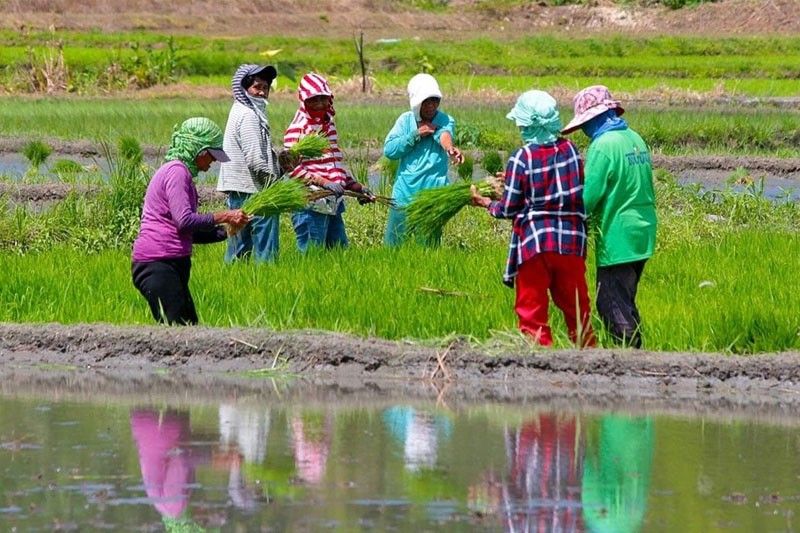
Marcos Jr., Concepcion Discuss Health, Economy and MSMEs
June 17, 2022
Concepcion: Health Technology Assessment Council (HTAC) Is Delaying PH Economic Recovery
June 26, 2022
Philippine Agriculture will Finally Receive the Support it Deserves
When president-elect Ferdinand “Bongbong” Marcos Jr. announced that he would take on the Department of Agriculture (DA) portfolio, I welcomed the decision. It was, I thought, a logical choice, and, if you followed closely the last presidential campaign, hardly came as a surprise considering how he consistently highlighted it in his platform.
In interview after interview, he declared his intention to improve the state of Philippine agriculture. He even elaborated on his plans during a record-breaking interview on Go Negosyo’s Kandidatalks series, which attracted more than a million viewers when it aired live over Facebook last Dec. 1.
For us at Go Negosyo, it is indeed a welcome decision, as it dovetails with our own commitment to help both entrepreneurs and agripreneurs. Many of our MSMEs are based in the agriculture sector, and the president-elect has expressed his intention to focus also on our country’s small entrepreneurs.
Our own Kapatid Agri Mentor Me Program (KAMMP) provides guidance and assistance to equip farmers, fisherfolks, agricultural cooperatives and associations, youth, and agri-enterprises with the right entrepreneurial mindset, practical knowledge, and strategies that can help expand their agribusinesses. KAMMP was started in 2017 and is an offshoot of our Kapatid Mentor Me (KMME) Program, which we started a year earlier. While KMME focused on MSME mentorship in general, KAMMP aimed its mentorship specifically to nurture and sustain agri-business enterprises.
Mentorship is one of three pillars of the Go Negosyo advocacy to help Filipino entrepreneurs, the other two being access to money (capital) and markets. Given the renewed support coming from the president-elect himself, the future bodes well for MSMEs, and now with him heading the DA, the agripreneurs also.
There are many programs that president-elect Marcos’ father started that can be revived and will redound to benefits for the country’s agriculture sector, especially now that we need to strengthen our food security. Masagana 99, the Food Terminal Inc. and the Kadiwa stores are only a few of the projects that I believe can be revisited today and could help us become more resilient against future global disruptions.
The challenges that many of our agriculture-based MSMEs face concern productivity, and there are, indeed, many factors that affect it. BBM expressed his intention to rebuild the value chain of agriculture, and that the agriculture sector, along with food security, will be a priority of his administration. I remember him telling me how he found it unbelievable that in his lifetime, the Philippines – a country with thousands of islands and tens of thousands of kilometers of coastlines – now finds itself importing galunggong.
One of the first things we felt during the pandemic was the disruption in the food supply chain and it revealed the weaknesses in our agricultural system. A very real food shortage brought on by rising commodity prices and the resulting embargoes on food exports is threatening our country, and it could be worse than what we felt during the lockdowns. The reality is, we have no control over if and when the Russia-Ukraine crisis will end, but we do have control over how well our farmlands can provide for our people. With hope, and with the president-elect himself now taking charge of the DA, Masagana 99 or a similar project will help raise our rice productivity while at the same time lift out of poverty many of our small farmers. Masagana 99 was, in my opinion, a successful project and is especially relevant today.
The president-elect is also a believer in science and technology. In our Kandidatalks conversation, he singled out the role of R&D in boosting the country’s rice production. However, he said that boosting our agri sector should not be limited to the search for high-yielding varieties, but should include the whole ecosystem of loans, access to agricultural inputs, mechanization, achieving scale through cooperatives, and infrastructure.
There were several infrastructure projects started in the 1970s like the Pantabangan Dam and Magat Dam that propelled Northern Luzon to become a powerhouse rice producer. None of the long-term agricultural solutions will succeed without dams, not now that climate change has started to make irrigation and flood control more difficult.
The president-elect believes the country should revisit the original intent for institutions like the National Food Authority, which was to stabilize market prices of commodities and keep prices at a level where farmers can still make a decent profit. Even then, before vertical integration became a business buzzword, there were initiatives like the Kadiwa stores and the Food Terminal Inc., which I believe will be quite timely.
With hope, and with the reforms and projects he will implement, the Philippines will hopefully become more resilient and able to withstand future disruptions in our food supply system, such as that we experienced during the lockdowns and now with the Russia-Ukraine crisis.
The president-elect can expect support in this matter, as Philippine agriculture has many champions in the private sector. SL Agritech’s Henry Lim Bon Liong has his Masagana Ani 300, an approach to increase yields using hybrid rice and no doubt inspired by Masagana 99. At Go Negosyo, there are hundreds of professionals and veterans in the agriculture sector who generously share their time and knowledge with small farmers at our mentoring sessions. They help us continue our efforts to mentor farmer-entrepreneurs through programs like KAMMP, dovetailing with the incoming administration’s efforts to help both the MSMEs and the agriculture sector. To date, we have mentored more than 3,000 agripreneurs, and we hope to reach out to more of them this year.

2/F RFM Corporate Center, Pioneer cor. Sheridan Sts. Mandaluyong City, Metro Manila, Philippines

